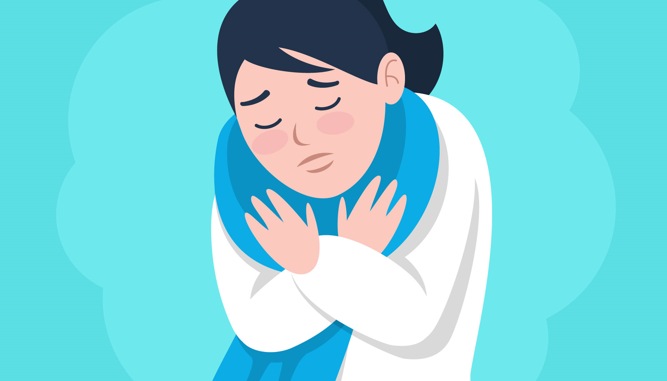
Chills refer to the alternate relaxation and contraction of muscles in a rapid succession. This is a mechanism through which the body generates warmth when an individual’s body losses heat and gets cold. It is often observed as a normal reaction. “Goose bumps” is a characteristic feature seen on one’s skin, usually described by many as a freezing sensation.
Table of Contents
Can you get chills without fever?
Chills are commonly associated with body temperature hikes or fevers, but this is not always the case. In certain circumstances, chills normally do precede fever’s onset. Sometimes they do occur without any rise in temperature. The severity of the chills is dependent on the underlying condition that is causing them. To treat them, there is need to determine the root cause and take the appropriate measure to alleviate it. However, one sometimes needs to just warm up and such chills disappear.
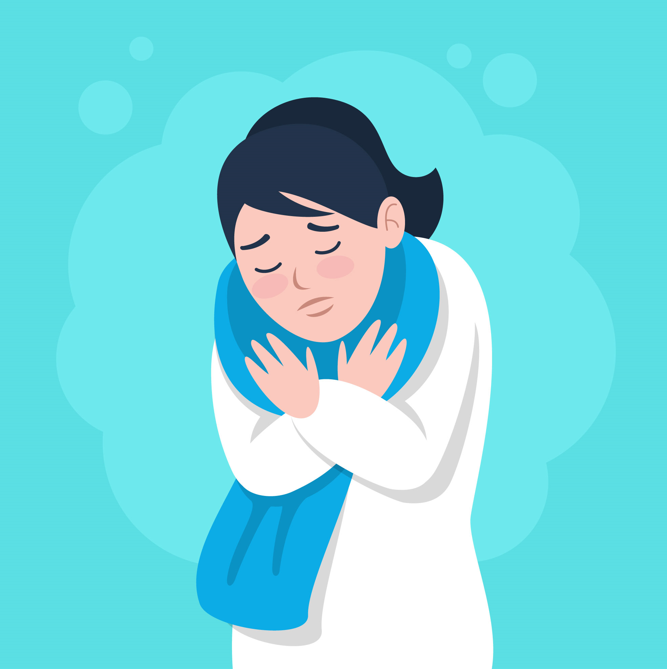
Signs of Chills
Chills usually come and go but can sometimes also remain constant.
- Chattering teeth –In case of a drop in the body temperature, the hypothalamus signals the body to initiate heat generation process. Shivering caused by the contracting muscles produces heat. Chattering teeth is common when one has got chills.
- Goosebumps – It is not a symptom but usually appears when a person feels cold.
- Sweating – When the body generates more heat in a cold environment, the warmer spots do produce more sweat. In addition to that, low temperature also causes reduced rate of evaporation of the moisture making the skin feel sweaty and clammy.
- Shivering or shaking–It results due to contractions of the muscles.
Chills without Fever- Causes
There are various conditions that manifest in chills without fever. Some of these conditions include:
Side Effect due to a Medication
Intake of some medications singly or in combination may cause chill without fever to occur. It can also manifest due to taking a dosage that is not correct as per the prescribed medication, herbal supplement, or a drug bought over-the-counter.For example, Effexor, Ibuprofen, Voltaren, and Ondansetroncan cause chills with no fever as a side effect.
Exposure to Cold Conditions
In situations whereby one is in a cold environment for example a pool or an ocean, or even being outdoors in a chilly day, one is likely to get chills. One can also get chills when indoors, if there isn’t enough warmth or when the air conditioning machine setting generates too much cold.As one ages, especially the older people, the body temperature regulation gets more difficult irrespective of whether one is healthy or not and hypothermia can occur even at room temperature.
The chills normally disappear once the body gets warm again. However, frostbite or hypothermia may result as a complication of continuous chills, following prolonged exposure to extremely cold conditions. The two conditions are potentially serious and life-threatening. Their symptoms include: numbness, slurred speech, changes in the skin’s color, blisters, and stinging sensation in the toes, ears, fingers, or nose. In case they do occur, it warrants medical help as soon as possible.
UTIs or Cystitis (Bladder infection)
These two conditions can cause chills without fever. Cystitis is caused by bacterial infection and one usually experiences a burning sensation while passing urine, pelvic pain and the urine is usually cloudy and has a bad smell. Serious bladder infections are known to cause chills that present with fever or none. Experiencing chills could be an indication of ascending infection involving the kidneys.
In this case one is required to increase water intake to aid in the release of toxins hence promoting healing. Cranberry juice contains high amounts of anti-oxidants and drinking it could be helpful in improving one’s bladder function.
Underactive Thyroid
Lowered activity of the thyroid glands result in a condition medically termed as hypothyroidism. In this case, the gland is not in a position to produce adequate amounts of thyroid hormone. The hormone is responsible for regulation of the rate of metabolism in the body as well as giving support to the individual’s overall health and wellbeing. This condition makes one hypersensitive to cold leading to manifestation of chills.
Other symptoms presented in hypothyroidism include:
- Depression
- Excessive weight gain that cannot be explained
- Puffy face
- Constipation
- Dry skin, hair and nails
- Muscle pain, weakness and stiffness
For proper functioning thyroid and avoiding the associated chills, one needs to have a healthy balanced diet having natural fats such as nuts, coconut oil, legumes, and seeds. Iodine supplementation in diet will also be beneficial.
Anemia
Anemia results when one’s blood hemoglobin level is below the normal range. This condition usually present with symptoms such as dizziness, fatigue, headache and chills that are not accompanied by fever.
To treat anemia, root cause needs to be established and one is encouraged to take adequate amounts of foods rich in iron and vitamin B12.
Malnutrition
Persistent lack of adequate nutrients by the body results in malnutrition. This could be due to:
- An underlying condition leading poor uptake of nutrient into the body from the gut
- An eating disorder for example anorexia
- Lack of adequate, balanced and nutritious diet
The proper function of the body is impaired when the balancing of the required nutrients is not achieved well. The presenting complains and symptoms of malnutrition include lethargy, lowered levels of concentration, rashes, pale skin, tingling sensation in the extremities or joints, and light-headedness. Women who are malnourished also present with cases of infertility, heavy menstruation, or missed periods.
The complications of untreated can be severe and may be responsible for chills.
Panic Attacks or Anxiety
Panic attack can present with chills that are not accompanied by a hike in temperature. Other symptoms include dizziness, pounding heart beat, chest pain, trembling and nausea. Anxiety can alleviated through adopting good relaxation techniques and use of essentials oils which aid in the reduction of stress levels.
Body’s Reaction to Rigorous Physical Activities
In the case of sport activities that task the body’s energy and involve intense physical exertion like marathon running to lead to alteration of the core body temperature. This may cause chills. Such response usually occurs in very hot or extremely cold temperatures, however, it can also manifest in any weather condition.
Dehydration and exhaustion occur in very hot temperatures where as cold temperatures do lead to hypothermia as well as dehydration. The resultant conditions could be responsible for the body’s reaction. In both situations, the symptoms that are experienced are:
- Muscle cramping
- Goose bumps
- Fatigue
- Nausea and vomiting
- Dizziness
Appropriate dressing and adequate hydration when performing various sport activities in preventing the occurrence of chill. One is also advised to avoid any form of tasking sport activities during extremely hot and cold weather conditions. It is also prudent to reduce the amount of time one spends performing strenuous activities.
Proper hydration and reversing the body temperature to normal usually alleviates the symptoms. However, some situations may require the individual involved to get an infusion of intravenous fluids as a treatment solution.
Emotional Reaction
In the event of a situation that causes one to have an intense or profound emotional reaction, one is very likely to develop chills. They can also result due to experiences that make one get extremely moved emotionally in a positive manner such inspirational words or music.
The reaction is known as “frission” and is also sometimes termed as “goose pumps” or “chills going up the spine”. This reaction is attributed to the release of a neurotransmitter known as dopamine by neurological mechanisms.
Hypoglycemic State
Hypoglycemic state results when are blood sugar is lower than the normal levels and usually need treatment as soon as possible to normalize the blood sugar levels. For an individual suffering from diabetes, it could result due to diet adjustments or changes in the medication taken. State of hypoglycemia can also occur in persons who do not have diabetes.
Symptoms of hypoglycemia include;
- Numbness and feeling of shakiness (mimics chills)
- Heart palpitations
- Seizures,
- Confusion
- Sweating
- Irritability
- Tingling sensations felt around the mouth
- Blurred vision
Sepsis
Sepsis refers to blood infection and can lead to blood clotting, organ failure and also hypotension. It occurs due to entry of bacteria into the circulatory system. It can due to conditions such as pneumonia, meningitis, or appendicitis. It usually manifest with shaking chills that are associated with low or elevated temperature.
Treatment for Chills without Fever, Control and Prevention
Determination of the underlying conditions triggering the chills is very important in the treatment. The treatment is geared at alleviating the root cause through administration of appropriate interventions.
The recommendations below can be useful in controlling the occurrence of chills.
- Wearing warm protective clothing when the weather is chilly
- Taking a warm shower
- Drinking a hot drink to warm p the body
- Moderate physical exercises to help raise the body temperature
- Wearing warm night gowns and ensuring that one sleeps inside at night
- Access to a healthy, adequate and a well-balanced diet.
Authoritative Clinical References
Fever, chills and night sweat – https://www.ncbi.nlm.nih.gov/books/NBK324/



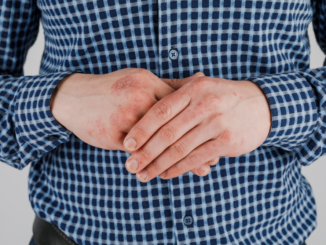
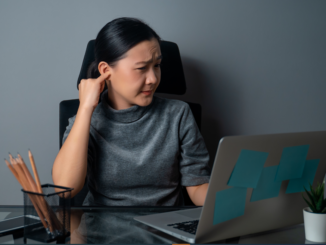
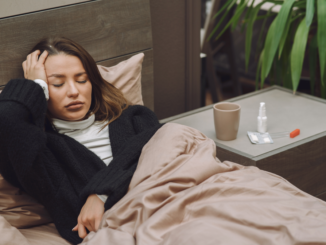
Be the first to comment